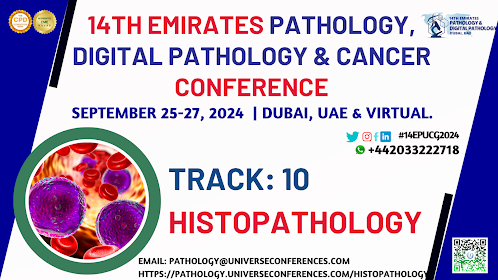Call for paper Track: 12 Immunopathology
12th Emirates Pathology & Digital Pathology Conference on December 21-23, 2022 in Dubai, UAE
A subspecialty of medicine called immunopathology examines
immunological reactions linked to disease. It encompasses research on how the
immune system, immunity, and immunological responses relate to the pathology of
an organism, organ system, or illness. It is a term used in biology to describe
harm done to an organism as a result of an infection by the organism's own
immune response. It might result from an imbalance between the infection and
the host species.
the investigation of how immunological mechanisms contribute
to illness development, diagnosis, and care.
1. The area of biomedical science studies diseases triggered by immunological mechanisms, immune responses to diseases, and immunodeficiency diseases.
2. Immunological responses to sickness or diseases that are
brought on by immune mechanisms, as well as their structural and functional
symptoms
12th Emirates Pathology & Digital Pathology Summit
on December 21-23, 2022 in Dubai, UAE
immunological
diseases
Normally, the sickness is brought on by underlying immune
system flaws. The immune system is put to the test in this circumstance,
leading to reactions that harm cells and tissues instead of defending them.
Malnutrition, gene alterations, and viruses, including HIV, are the causes of
all immunodeficiency illnesses, which raise the risk of tumours and infections.
Immune Dysfunction
Symptoms
·
Bowel problems.
·
infection by parasites.
·
overgrowth of candida.
·
Both asthma and allergies.
·
colds and flu that are common.
·
autoimmune illnesses.
·
muscles and joints that hurt.
·
outbreak of herpes (cold sores).
·
abnormal PAP smears and HPV.
·
Chronic runny nose or rhinitis.
·
eczema, psoriasis, hives, or rashes.
Technologies in Immunology
This
experimental approach is used to investigate the composition and operation of
the immune system. There are numerous methods, including:
ELISA.
\sELISPOT.
isolation of
immune cells.
Immuno-histo-chemistry.
development
of antibodies
Precipitation
and immunoblotting.
Antibody
isolation and purification.
12th Emirates Pathology & Digital Pathology Congress
on December 21-23, 2022 in Dubai, UAE
Illness or
disease can be brought on by flaws or faults in the innate or adaptive immune response.
Such illnesses are typically brought on by either an inefficient immune
response, an improper immune response to oneself, or an overactive
immunological response (known as hypersensitive reactions).
Heightened sensitivity
Hypersensitivity
reactions are unfavourable immune system-generated responses. Four different
categories of hypersensitivity reactions exist.
Type I: Instantaneous sensitivity.
Type II: Hypersensitivity that is
cytotoxic or antibody-dependent.
Type III: Illness with an immunological
complex.
Type IV: Sort of delayed sensitivity.
12th Emirates Pathology & Digital Pathology Event
on December 21-23, 2022 in Dubai, UAE
Type I The most typical sort of
hypersensitivity reaction is hypersensitivity. It is an allergic reaction
brought on by repeated exposure to a particular kind of antigen, or allergen.
Unlike the immunological response that is expected,
Type II Rare hypersensitivity reactions
can take two to twenty-four hours to manifest. IgG and IgM antibodies attach to
the patient's own cell-surface molecules to create complexes that activate the
complement system, causing these kinds of reactions. Red blood cell
agglutination and opsonization are the results of this.
Type III Instead of cell surface
molecules as in type II hypersensitivity reactions, hypersensitivity reactions
happen when IgG and IgM antibodies bind to soluble proteins, generating immune
complexes that can deposit in tissues.
Type IV Reactions are cell-mediated and
independent of antibodies. They are the second most frequent kind of
hypersensitivity reaction, and they often take two days or longer to manifest.
Overstimulating T cells, monocytes, and macrophages triggers these types of
reactions by releasing cytokines that induce tissue damage, cell death, and
inflammation.
Conclusion
The first immunological, general defence against pathogens
is called innate immunity. A number of cells, including phagocytes, mast cells,
basophils, and eosinophils, as well as the complement system, mediate this
quick immune response, which happens minutes or hours after aggression. In
order to combat infectious organisms, innate immunity and adaptive immunity
co-evolve. Adaptive immunity depends on the carefully controlled interactions
of T cells, APCs, and B cells. The development of immunologic memory, or the
capability of the system to learn from or record its experiences with different
pathogens, is a crucial aspect of adaptive immunity. This ability enables the
system to respond quickly and effectively when exposed to the same or similar
pathogens in the future.
12th Emirates Pathology & Digital Pathology Seminar on December
21-23, 2022 in Dubai, UAE
Important Information:
Conference Name: 12th Emirates Pathology &
Digital Pathology Utilitarian Conference
Short
Name: 12EPUCG2022
Dates December
21-23, 2022
Venue: Dubai, UAE
Scientific Program: It will only
include plenary speakers, keynote speakers, panel discussions and presentations
in parallel sessions.
Audience: Global Leaders,
Industrialists, Business Delegates, Students, Entrepreneurs, Executives
Email: pathology@universeconferences.com
Visit: https://pathology.universeconferences.com/
Pathology Experts:https://pathology.universeconferences.com/pathology-experts/
Call for Papers: https://pathology.universeconferences.com/submit-abstract/
Register here: https://pathology.universeconferences.com/registration/
Call Us: +12073070027
WhatsApp Us:
+4420332227110
Pathology Medical Conferences, Histopathology
meeting, Immunology
conference, clinical
Pathology webinars, Plant
Pathology Conferences, CME
Pathology Conferences, Pathology
Congresses, World
Pathology Congress, Clinical
Pathology, Laboratory
Medicine Conference, Digital Pathology exhibition
Reference pathology and digital pathology
UCGconferences press releases and blogs
Medium: https://medium.com/@traviis.stork/call-for-paper-track-3-breast-pathology-837328eaad1
Globa lhealth : https://globalhealthtrainingcentre.tghn.org/community/blogs/your_posts/
Linked In: https://www.linkedin.com/pulse/call-paper-track-3-breast-pathology-dr-travis-stork-1f
Tumbler: https://www.tumblr.com/blog/view/digitalpathologyucgconferences/689005131446059008?source=share
#surgery #microbiology #anatomy #biochemistry
#anatomy #medstudent #medstudent #pathologists #histology #medicine
#pharmacology #medschool #biology #medico #dermpath #microscope
#clinicalresearch #medicalstudent #medicaleducation #Covid19 #omicron #bpath
#meeting #Breastcancer
#Breastpath #Cencer #cancerawareness #chemotherapy #cancerdemama #health
#breastcancerwarrior #cancerfighter #breastpathology #breastcancerfighter
#breastcancersupport #UCGConferences
#MolecularPathology #SLPath #pathologist




.png)
Comments
Post a Comment